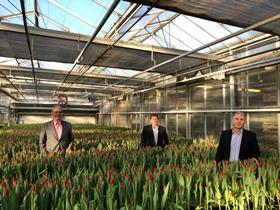
The AHDB Petitioners have slammed Growers Better Levy Group (GBLG) proposals to replace AHDB with a new, grower-levy-funded R&D body, describing them as 'patronising', unrepresentative and 'going against the result of two votes on the issue'.
The petitioners' group, fronted by South Lincolnshire growersSimon Redden, John Bratley and Peter Thorold, voted last February to abolish the statutory AHDB horticulture and potato levy. And in a statement published today (17 December), the AHDB Petitioners said the latest proposals to Defra by the GBLG ignore the fact that almost 490 growers voted against the continuation of a statutory levy.
“By its own admission, the GBLG is ‘not a democratically elected board’ and represents just three per cent of those horticulture businesses that were eligible to vote on the continuation of a levy at the end of 2020,' Bratley said. 'In terms of the potato sector, it represents just three growers out of 1,860 eligible voters. Once again, we have a very small minority trying to tell growers and Defra what is best for individual and highly diverse grower businesses. We know from the comments we have received from hundreds of growers that they know what is best for their own businesses.”
The period following the demise of AHDB in the horticulture and potatoes sector has given businesses the chance to take stock and prioritise their R&D needs, he continued. “For example, top fruit growers have real issues with canker, while many vegetable growers are more concerned about farmgate prices rather than technological innovation at the moment. Post-AHDB growers finally have £13 million in saved levy (as well the £40 million that Producer Organisations will receive annually) to spend as they see fit on their own R&D priorities. It must also be remembered that the substantial tax relief available on such spending would be lost with any statutory levy scheme.”
In recent months a number of organisations in the research and advisory fields have begun to approach grower groups about their research needs, and the signs are that a much more focused and dynamic industry approach to R&D is beginning to evolve, Bratley added.
'Such direct dialogue between growers and researchers would be undermined by the reintroduction of any new levy body – something which would also require significant parliamentary time to create the necessary statutory instruments,' he said.
Spalding-based flower grower Simon Redden criticised GBLG for failing to accept the result of the original levy ballot: “They are like Remainers in the Brexit vote who simply won’t accept the result of the democratic majority,' he said. 'Twelve months after the levy ballot they are trying to rewrite the clear result to suit their own needs, rather than the needs of the majority of growers.”
He added that 'telling growers how to answer the questions on the current Defra consultation was simply insulting'.
Simon Redden, John Bratley and Peter Thorold have become known as the AHDB Petitioners. Based in South Lincolnshire, they collectively grow potatoes, vegetables, and flowers across 2,025 ha (5,000 acres) of land, and 5.6 ha (14 acres) of glasshouses. Together they employ about 250 personnel and have a combined turnover of £20 million.



